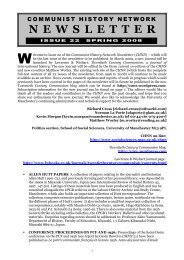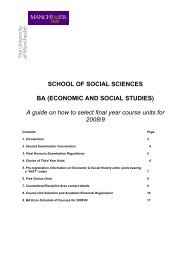POLI20532 Course Outline 1112 - School of Social Sciences
POLI20532 Course Outline 1112 - School of Social Sciences
POLI20532 Course Outline 1112 - School of Social Sciences
Create successful ePaper yourself
Turn your PDF publications into a flip-book with our unique Google optimized e-Paper software.
<strong>POLI20532</strong>: <strong>Course</strong> Guide 2011-12<br />
WEEK 4<br />
Was an age <strong>of</strong> affluence inevitably an age <strong>of</strong> Conservatism? Or is<br />
it a mark <strong>of</strong> Conservative success that we think <strong>of</strong> the 1950s as an<br />
age <strong>of</strong> affluence?<br />
4.1 Questions<br />
1. Was the 1950s really an ‘age <strong>of</strong> affluence’? And why was affluence such a potent<br />
concept politically?<br />
2. Was it affluence that led to Conservatives electoral success; if so why? Was<br />
aspirationalism and consumerism more compatible with Conservative values? Or was it<br />
Conservative good fortune to be holding <strong>of</strong>fice in a period <strong>of</strong> rising living standards and<br />
general material security? Does Conservative success – even after Suez – show that the<br />
economy is the key to winning elections?<br />
3. Why was Labour unable to consolidate its record vote <strong>of</strong> 1951? Were its internal<br />
divisions and apparent drift major factors in the Conservatives’ success? Why was Labour so<br />
divided? Did affluence itself pose it new challenges; or had the old Labour project run out <strong>of</strong><br />
steam? How important respectively were personal, ideological and organisational factors?<br />
4. What was Butskellism? Is this an accurate way <strong>of</strong> characterising the politics <strong>of</strong> the<br />
1950s? Should this be regarded as the heyday <strong>of</strong> a social-democratic consensus?<br />
5. How accurate was Labour’s claim <strong>of</strong> ‘thirteen wasted years’? Did the rise in living<br />
standards disguise the fact <strong>of</strong> relative decline and the continued failure to modernise either<br />
the British economy, the British state, or its relations with the world outside it?<br />
4.2 Essential readings<br />
(i) Harriet Jones<br />
OR<br />
(ii) Harriet Jones<br />
‘The Cold War and the Santa Claus syndrome:<br />
dilemmas in Conservative social policy-making<br />
1945-57’ in in Francis and Zweiniger-Bargielowska,<br />
The Conservatives and British Society 1880-1990, pp.<br />
240-54;<br />
‘New Conservatism’ in Coneckin, Mort and Waters,<br />
Moments <strong>of</strong> Modernity (HD; also on Blackboard).<br />
4.3 General texts and alternative readings<br />
Kenneth Morgan Britain since 1945, chs 4-6.<br />
David Childs Britain Since 1945, chs 4-6<br />
Kevin Jeffreys, Retreat from New Jerusalem. British politics 1951-<br />
1964 (1997)<br />
17
















